- Engine oil and Filter
- Air/fuel Filters and spark plugs
- Timing Belt or chain and Water pump
- Drive Belts, tensioners and pulleys
- Cooling System
- Ignition, electrical, sensors and engine computer (ECU)
- Fuel System
Vehicle engines form the 21st century are a sophisticated pieces of engineering. They have more power output, are smoother, lighter and use less fuel then from the previous century.
New fuel injection and turbo charging technologies, computer software, tighter tolerances and lighter materials have contributed to it’s success. However if there is a problem it does require a lot more knowledge and skill to get it rectified.

Most newer engines require do require specialized servicing techniques, special oil and are not very tolerant to overdue service schedules.
Some service schedules are in our experience/ and other independent repairers too long, as the manufacturers want you to believe it will require less servicing.
Some state up to 2 years / 25,000km between visits, which may be ok is you are driving thousands of kilometers on German autobahns - as opposed to Melbourne peak hour traffic and the occasional country trip.
However the car manufacturer’s main aim is to sell you a new vehicle and cover the cost of your repairs only until the warranty runs out which is usually 3 years.
Then usually there will be an attempt to entice you to buy a new car so you will get the latest features, and you won’t have to pay for repairs in the new warranty period.
This sounds great however the reality is you will lose at least half of your original purchase price in 3 years when you trade it in. Unless the car is no longer suitable for your needs, your ownership costs are substantially lower if you keep and maintain the car for few more years.
If the car is maintained more regularly and correctly from the start, then your repair costs are lower for the time that you own the vehicle, and will command a higher price when you sell it.
Engine oil and Filter
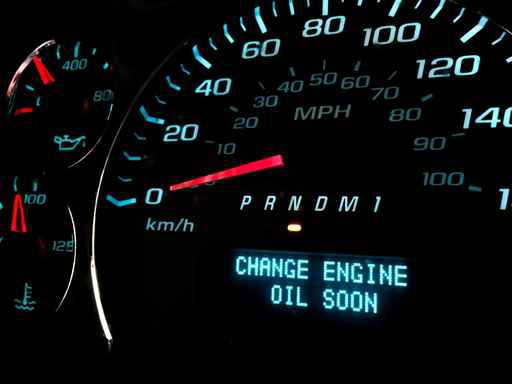
Most city vehicles are used for short trips which do not give enough time for engine to heat up to required temperature, and stay there long enough to flush away contaminants into your oil filter.
This forms oil sludge which can block up you oil delivery system and your engine will lose oil pressure.
Also high amount of heat up and cool down cycles put additional stress on your engine and auto transmission. As the vehicle gets older oil sludge will build up in your engine every time you drive.
if you leave the servicing for too long, or you oil fume recycling system (PCV) is not fully operational, and some sensors may not work properly (you may not always get a warning) and over time you will be up for expensive repairs.
This is a BMW engine which did not have regular oil services. The sludge buildup was impossible to clean and it required total engine replacement, which costs thousands of dollars.
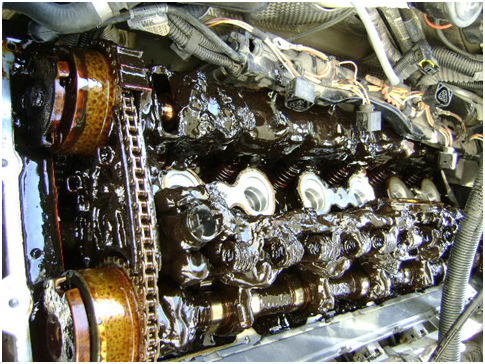
To keep your engine in top condition and avoid oil sludge, we advise our clients to change oil every 6 months or 10,000 kms (whichever comes first) despite of what your oil service indicator displays.
That’s why we recommend for our Melbourne clients that the engine oil and filter is changed every 6 months or 10,000 kms (whichever is sooner) and this will also give us the opportunity to inspect your car thoroughly for current and potential problems.
We only use the correct oil for you engine and Genuine /Oem or quality aftermarket oil filter.
Air/fuel Filters and spark plugs
Spark plugs have to be changed as per service schedule as they do wear with the kilometers you travel and will cause harder starting, increased fuel use and rougher running and even misfires if their replacement is overdue. Most new engines use platinum/iridium spark plugs which last at least 60,000 kms.
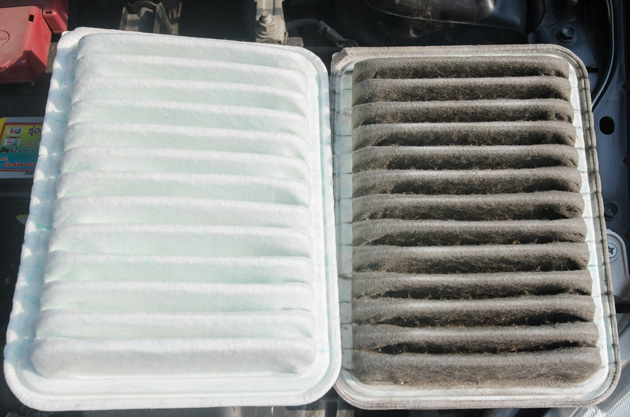
Air filters have to be changed per schedule a more often if you are driving in a dusty environment eg:dirt roads. An air filter which is partially blocked can increase fuel consumption by as much as 10%.
Separate fuel filters should be changed at least every 60,000 kms or 4 years as over they can get partially blocked from microscopic dirt in the fuel you buy at your petrol station – and your fuel pump has to work harder to push the fuel through the blocked filter making it fail prematurely (it is also a god idea to change it after you ever run out of fuel as the fuel pickup will suck the dirt collected on the bottom of the tank and dump it all into your filter).
When the pump fails your car will won’t start or it will stop and you will have to get it towed for pump replacement. Note: some models have the pump and filter as one assembly with a different design - filters on these last a lot longer.
Timing Belt or chain and Water pump
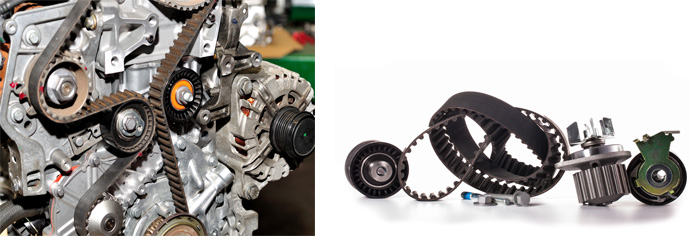
A large number of vehicles do have rubber timing belt for transmitting rotational force from the engines crankshaft to run the cams overhead (located on your cylinder head) which open and close valves and allow the operation of your engine. Some engines do have a chain for this function and some use pushrods with the cam in the middle of the engine block.
If your engine has a timing belt - these do need to be replaced when due as specified by the manufacturer. As these do deteriorate and can break without warning potentially destroying your engine, is it strongly advisable and cheaper in the long run to stick to the recommended period which vary depending on your engine model.
The replacement period depending on your model is usually 60-150,000 kms and 4 to 6 years (whichever is sooner)
When the belt is replaced it is recommended that all the associated tensioner components and the water pump, as these do wear and the additional labour charge is minimal since the timing belt area is already disassembled.
Timing Chain and pushrod driven valves. These do not generally require replacements during service and are designed to last 250,000 kms or more, however if your engine oil and filter are not changed regularly or you have a model of engine which stretches timing chains it will have to be replaced when this happens.
Timing chain replacements are usually dearer than timing belt replacement as the procedure takes more time.
Pushrod overhead valve engines only require regular oil and oil filter change and generally pushrods do not need to be replaced.
Drive Belts, tensioners and pulleys
On most modern cars the serpentine belt (drive belt) does have quite a long lifetime (older vehicles have v type belts which need to be changed more often). Both types do develop cracks from our hot weather, stretch, become frayed, make noises or break.
The main aim of the belt/s is to drive the engine accessories like your water pump, power steering pump (in some vehicles) & alternator and air conditioning compressor.
The common symptoms of as stretched, frayed or broken belt and or bad tensioner or pulleys could be:
- Making noises
- Battery not charging
- Car overheating
We inspect the drive belts tensioners and pulleys every time you bring our car in for service.
Cooling System
Generally the cooling system consist of these components. The water pump, Thermostat, hoses, valves, radiator, expansion tank, fan/s and internal heater for the inside of the car which also has a fan.
The system is designed to keep your engine cool so it does not overheat and also to supply heat into the passenger cabin.
If the system is not in a 100% condition then it should be repaired ASAP as if there is not enough coolant, if it is leaking, the water pump is broken, thermostat stuck, hose has burst, the radiator is blocked or the cooling fan does not work then your car will overheat. We also recommend replacing your coolant every 2 years as it degrades and picks up contaminants as it circulates- which can block your radiator and wear your water pump bearings.
If the car overheats then you should call us and either organise RACV or ourselves to tow to our workshop for to prevent further damage to the engine.
If the car does not reach normal temperature (around ½ on your temp gauge) it is usually the thermostat which has failed to close and your vehicle will be running under operating temperature.
This is also not a great situation as you will find your car heater is quite weak and most importantly there will be more wear and oil sludge as the engine will not be running at full operating temperature.
Ignition, electrical, sensors and engine computer (ECU)
Today’s engines run sophisticated electronics systems which monitor engine performance and adjust fuel and ignition cycles, and also connect to the other car systems like your auto transmission, comfort systems and air conditioning.
There is a multitude of sensors and solenoid actuators, electronic injectors and ignition coils which all have to work 100% for your engine to run efficiently.
To diagnose these quickly we use the latest in scan tools and ignition diagnostic technologies.

Fuel System
Whether you engine runs on petrol, diesel or lpg your fuel system has to provide the right air-fuel mixture at the right time, in order to burn efficiently and safely in your combustion engine.
The system has to be free of any leaks as a fuel leak will waste fuel and can cause a fire.
The fuel pump has to supply the right pressure to the fuel injectors in petrol/diesel and some lpg engines. Having a clean fuel filter to supply the right pressure (and not to overload your fuel pump which will cause early pump failure), and a clean air filter to supply the right quantity or air is imperative.
The fuel injectors which operate open and close hundreds to thousands of times every minute your vehicle, have to be clean to atomize fuel in the best spray pattern. The whole system usually controlled by a multitude of engine sensors connected to your car computer (ECU).
If your fuel system is not working correctly then your engine may run rough, use more fuel and produce more emissions (which can damage your expensive catalytic converter) or may suddenly stop or not start at all.
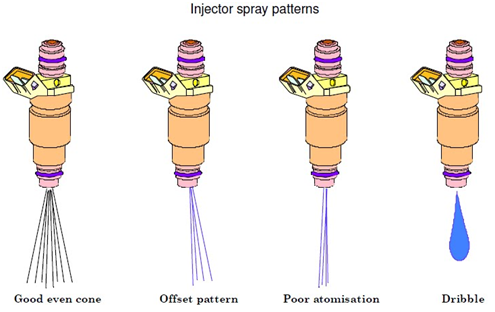
Our mechanics and diagnose and rectify your fuel problem and also clean your port petrol fuel injectors without removing them from your engine (in most cases) using our carbon and injector clean equipment.
Faulty petrol direct injection injectors, lpg injectors and diesel fuel injectors will require removal from the engine we can organize them to be reconditioned or replace them if faulty.
When we inspect your vehicle we will report to you any problems we discover in your engine components and recommend rectification if needed.

